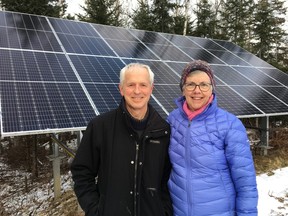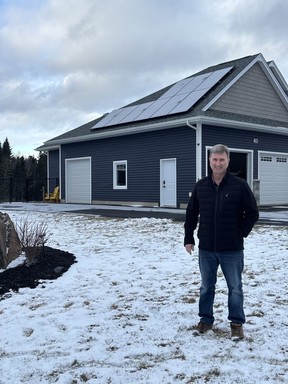The number of solar energy installations has exploded worldwide, but not so much in New Brunswick

Article content
A new group wants to bring more sunshine into people's lives.
Advertising 2
Article content
Solar NB held its first meeting on Saturday, January 11th in New Maryland near Fredericton. The goal is to promote the renewable energy source and figure out how to persuade more New Brunswickers to install the panels, which have exploded in popularity worldwide, but not so much locally.
“Solar energy is booming around the world,” says sustainability speaker Carl Duivenvoorden, who powers his entire family home and electric vehicle in Upper Kingsclear with two ground-mounted solar panels. It's a change he made a few years ago that has seen his electricity usage on his NB Power bill drop to zero each month.
Why not follow this trend here in New Brunswick?
Carl Duivenvoorden
He is the new treasurer on the nine-member board, which includes solar installers, system owners and other enthusiasts.
“There is exponential growth in the installation of solar systems almost everywhere. So why not follow this trend here in New Brunswick?”
China has been leading the way in installing the panels at an incredible pace and now has around 60 percent of the devices. But other countries from different parts of the world have also joined the race: the USA, Brazil, Germany, India, Spain, Japan, Italy, Australia and the Netherlands complete the top 10 when it comes to solar systems in 2023.
Total production was extremely high due to falling panel prices and greenhouse gas reduction targets as the world continues to warm dangerously due to our reliance on fossil fuels and the greenhouse gases they emit.
Article content
Advertising 3
Article content
The Global Solar Council, a trade association representing over 97 percent of the world's installed solar power capacity, and SolarPower Europe estimate that there were two terawatts of solar capacity worldwide as of November 2024.
That's enough to power a billion homes, or equivalent to the total installed electricity capacity of India, the United States and the United Kingdom combined.
What is truly astonishing, however, is that between 1954 and 2022 only one terawatt of solar capacity existed. Total capacity worldwide doubled in just two years.
“We are still in the early days of solar energy in New Brunswick,” says Barry Gallant, who runs SolarGen Energy in Fredericton and is the new CEO of Solar NB. “In China, because of the way they are set up, everything is controlled by the government. It's top down, right? And we are going from the bottom up and trying to convince people and the government that this is the best way forward.”
Gallant's company was founded in 2018 and installed 12 solar systems for homes and businesses last year. This year he hopes to at least double the number of installations.
He mainly advises customers and designs the systems and commissions two trusted electricians to carry out the work.
“Things are really picking up,” Gallant said. “This is quite an adventure for me.”

Solar NB's goal is to lead the way in advocating for solar readiness in building codes, addressing issues related to safety, insurance and other member concerns, and educating and promoting solar technologies in the province, according to the press release.
Advertising 4
Article content
“All of this has a positive impact on the environment and reaps the long-term benefits of clean, renewable energy,” it says.
But the group also knows that there are barriers.
One of them is the acquisition costs. Duivenvoorden said his two panel arrays and backup battery cost nearly $40,000, a price that was brought down to nearly $30,000 by provincial and federal incentives.
However, thanks to NB Power's net metering program, his family can earn credits by adding energy to the grid when there is more solar power than they need. When the sun isn't shining, the family can rely on NB Power's system or battery, useful during storms and outages. The Duivenvoordens never lose power when others in their neighborhood do so.
Every month he receives the regular service charge of almost $30 on his NB electricity bill, but nothing for energy consumption. His situation is becoming more attractive by the day as NB Power's electricity tariffs for other residents rose by almost 10 percent last year and are expected to rise almost the same this year.
They just sit there and collect the sun's photons all day and convert them into electricity.
Barry Gallant
Duivenvoorden said that for most people who install a simple solar system, the investment will be paid back within seven to 10 years. If you install an expensive backup battery, it will last 12 to 15 years.
But so far, he is one of just 750 net metering participants across the province. That compares to 43,000 solar installations in homes, businesses and other buildings across the country, according to the Canadian Renewable Energy Association.
Advertising 5
Article content
“One of the barriers is definitely the cost,” Duivenvoorden said. “But the federal government offers good financing options. The Canada Greener Homes Loan offers up to $40,000 in interest-free financing for 10 years.”
Duivenvoorden, a self-confessed energy freak, admits he gulped before taking the plunge.
“I finally thought, 'You know what, this works all over the world, why wouldn't it work here?' And I just said, “Let’s get started,” and we got our first array. After seeing how it worked, it wasn’t long before we had our second array and boom, we’re at net zero.”
Gallant has a similar sales pitch when speaking to potential clients.
“It is an investment that pays off. If you put solar panels on the roof of your house, they will last for 25 years because they have no moving parts, right? They just sit there and collect the sun's photons all day and convert them into electricity. It reduces a large part of the customer's electricity bill. And business has really increased in the last few years because, as you know, electricity bills keep going up.”
Article content
